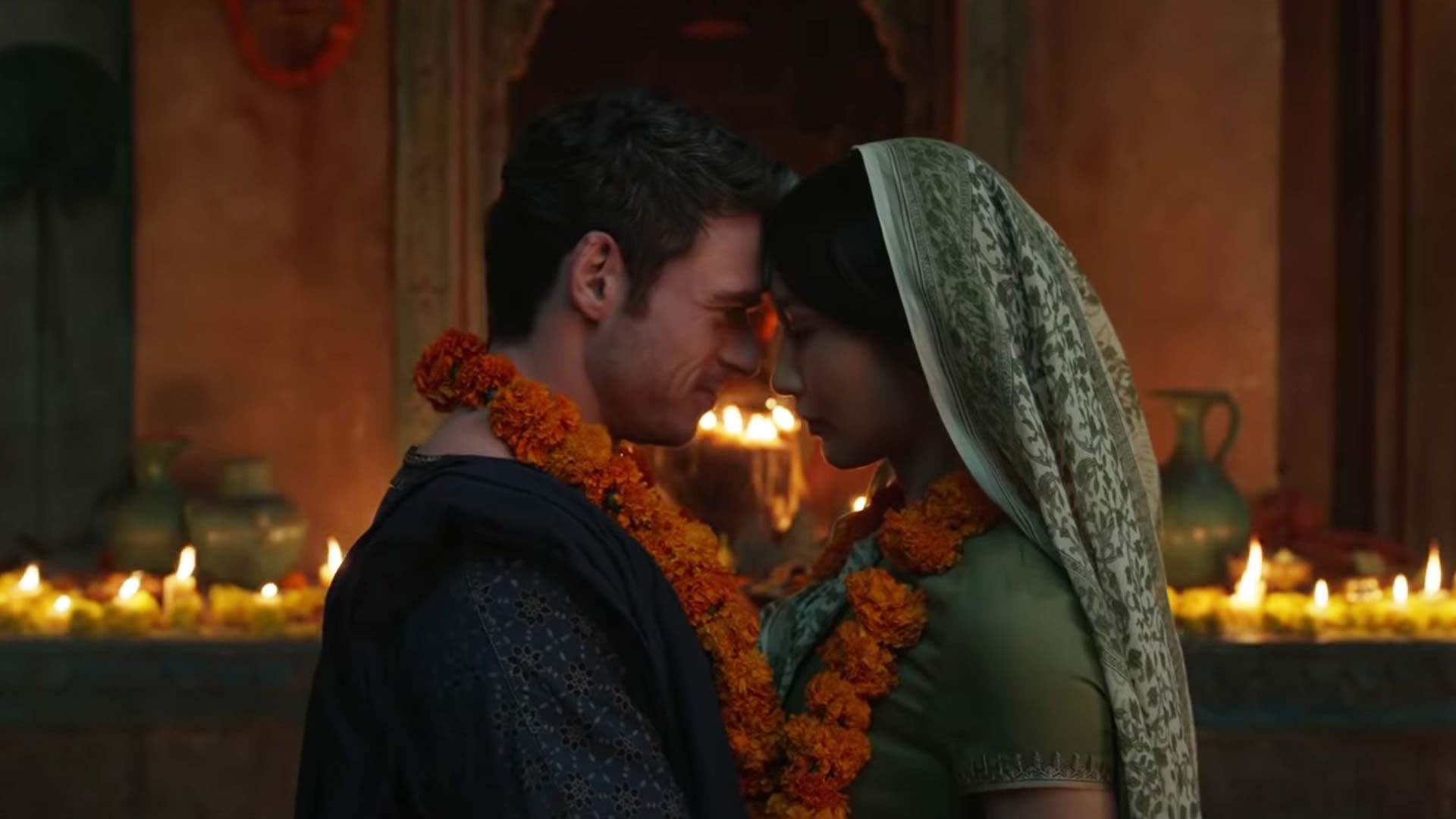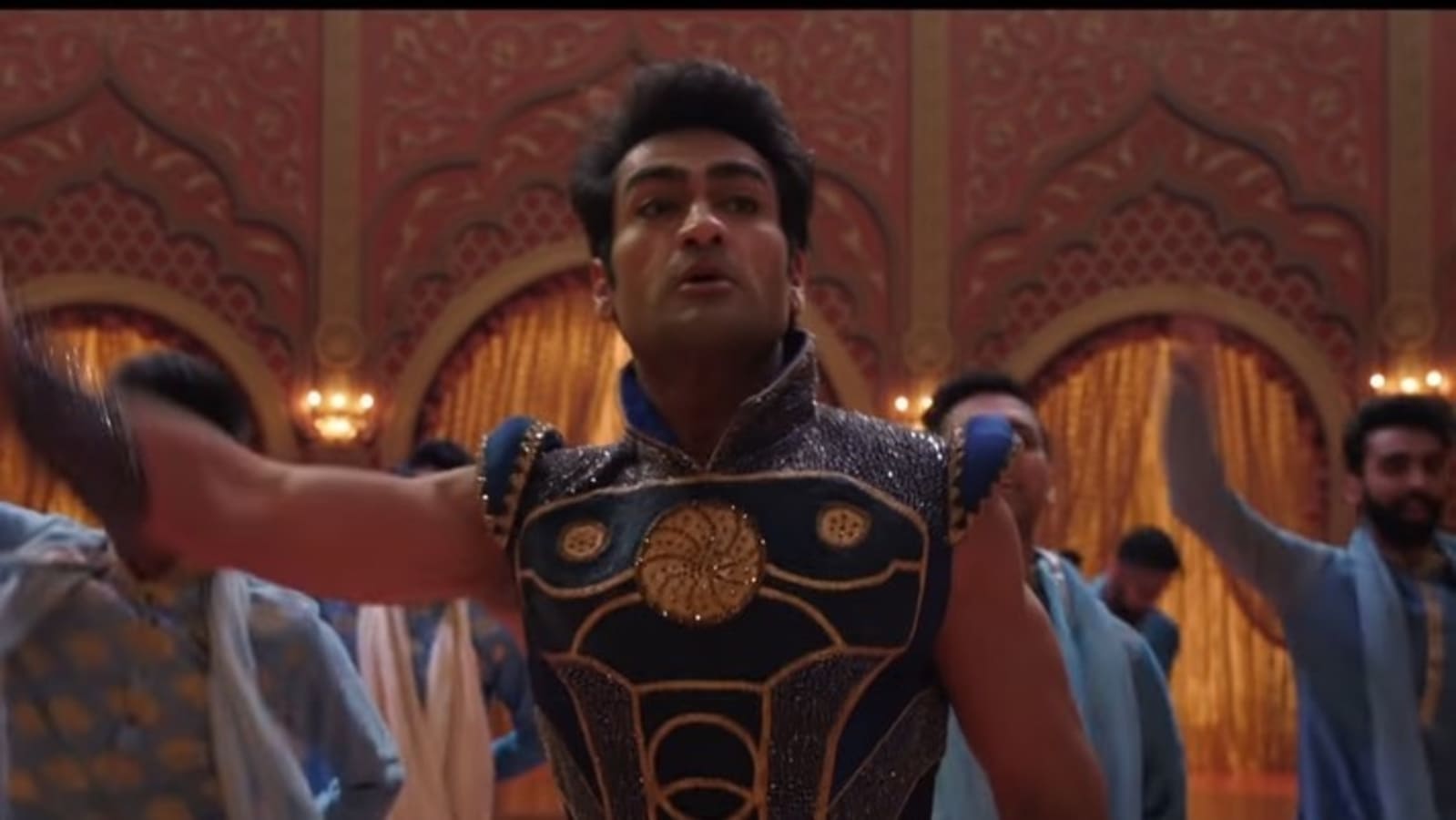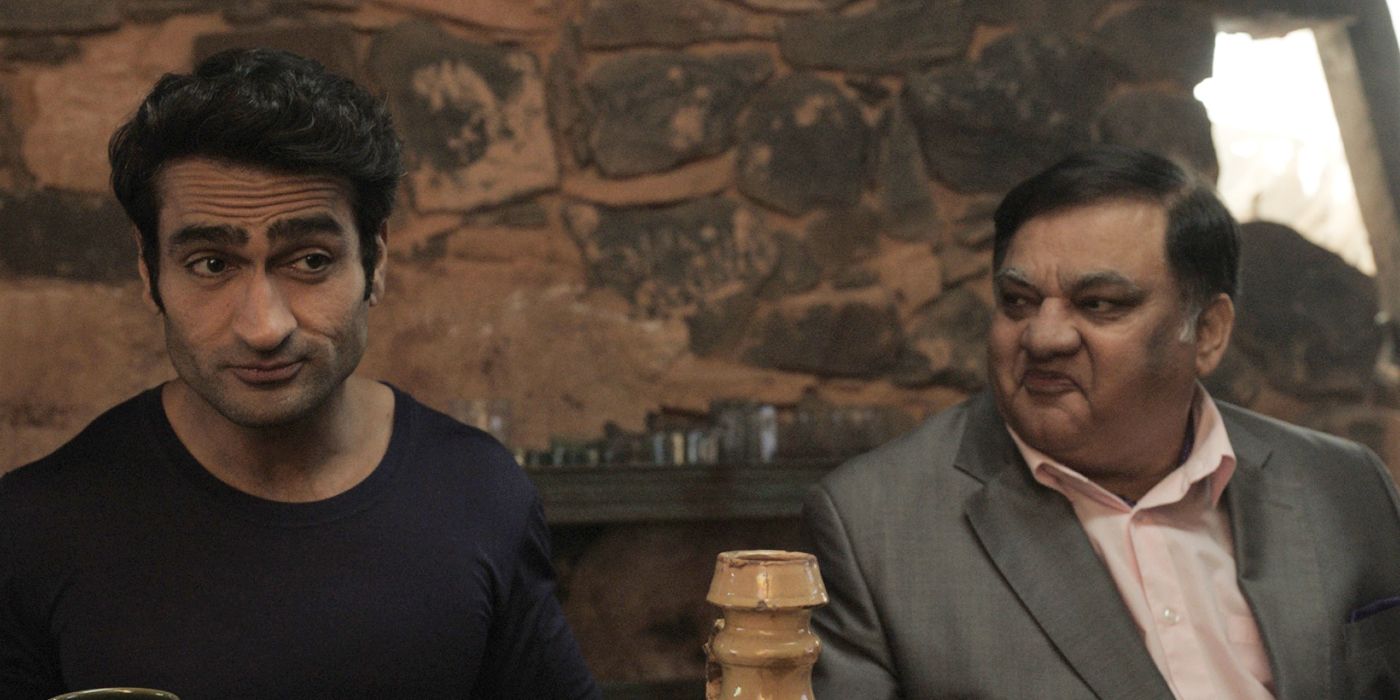Chloé Zhao’s latest Marvel venture Eternals revolves around the titular superhero team and boasts of a diverse and inclusive cast.
As the bunch of immortal heroes trot across the globe, they also reach India during the reign of the Gupta Empire. Out here, Richard Madden’s Ikaris and Gemma Chan’s Sersi decide to have a Hindu-style wedding for some reason, complete with garlands and divine idols.
Right after garlanding each other, the couple also engage in a kiss – making the wedding not so accurate. Who even kisses at a Hindu wedding?
But maybe I am overanalysing the small scene in the film.

Ikaris and Sersi in a Hindu marriage, a still from Marvel’s Eternals.
Eternals’ tryst with India continues as Kumail Nanjiani’s Kingo makes a peculiar and rather grand entry.
Dressed in a glittery blue costume, Kingo raises an eyebrow at a woman who lifelessly sings a song called ‘Naach Mera Hero’. As the phrase keeps on getting repeated, Kingo and a troupe of background dancers break into an awkward dance routine. The grand set design makes the viewer wonder whether this is a Sanjay Leela Bhansali film or a Manyavar ad.
The song ends and it is revealed that the immortal Kingo has given up his life as a protector of the planet and has become a Bollywood star instead.
The scene is reminiscent of stereotypical depictions of Bollywood. It reminded me of the time Dev Patel awkwardly danced to ‘Jhoom Barabar Jhoom’ in The Great Exotic Marigold Hotel 2 and the time when I saw the “Indian nerd” Baljeet dance in some ‘Oriental fantasy’ in Phineas and Ferb.
Also read: ‘Eternals’ Is Jaded and Bland – and Doesn’t Deserve a Medal for Being ‘Inclusive’
At the same time, the scene is still somewhat believable as a Bollywood shoot and it could indeed go down as a big-budget dance sequence in a Dharma Productions film. Further, Nanjiani’s awkward dancing only come across like a satirical depiction of some Indian films and their synchronised dance routines.

Kingo’s dance sequence from Marvel’s Eternals.
But then again, the average non-Indian viewer might not have introspected so much. Consistently showing India as Bollywood-centric can easily make one think that Indian cinema is all about the Hindi-speaking film industry, limiting the spread of cinema of other Indian languages.
Even the Hindi in the posters of Kingo’s films doesn’t quite translate well. For instance, ‘Shadow Warrior’ gets translated as ‘Yodha Chaaya’ (Warrior Shadow). Did no one in the crew care to get a decent and correct translation?
At the end of the day, maybe I’m overthinking. And what can I blame Chloé Zhao for when Mindy Kaling helms the polarising Never Have I Ever and while Priyanka Chopra earns an equally polarising reputation in India?
Also read: Review: Never Have I Ever… Seen so Many Stereotypes in a Show
Of course, despite these questionable scenes, Eternals has its merits. From playing a ‘brown nerd’ in Silicon Valley to a Pakistani-origin comedian in The Big Sick to being a jacked-up superhero in Eternals (courtesy of Marvel believing that only muscular men can be heroes), Nanjiani has come a long way and he seems to play Kingo with great ease.
The silver lining is also the fan-favourite character Karun, played by Harish Patel who many Indians would notoriously know as Ibu Hatela from the B-grade cult film Gunda. While this role does come off as a surprise, Patel has been living and acting abroad for quite some time now.
As Karun, he plays Kingo’s valet and loyal friend. Comparable to Batman’s Alfred, he records the Eternals‘ adventures on a handheld camera while asking funny questions and being wholesome in general. The depiction is surprisingly devoid of any Big Bang Theory or Simpsons-level stereotypes and Patel’s acting is butter-like.
Just like any other MCU film (or any big-budget Hollywood production), Eternals’ closing credits also roll with plenty of Indian names. And yet, the Indian elements end up feeling inaccurate.
Maybe, Karun is the redeeming aspect of Eternals but Hollywood still has to go a long way to go beyond the depiction of an upper-caste Hindu character dancing in a sherwani under a chandelier of a thousand lights.
One can hope that new diaspora voices in America can help undo such caricature-ish stereotypes. But for now, I’m bobbing the head to the guilty pleasure that is ‘Naach Mera Hero’. The senseless song (written by seven people) with its cliched tabla and orchestral “Indiannness” might go well with Kingo’s dance sequence but I have no idea why it is stuck in my head.
This is probably how Disney and Marvel exercise their global hegemony…
Shaurya Thapa is a freelance journalist, who mostly writes on pop-culture, music, and cinema.

